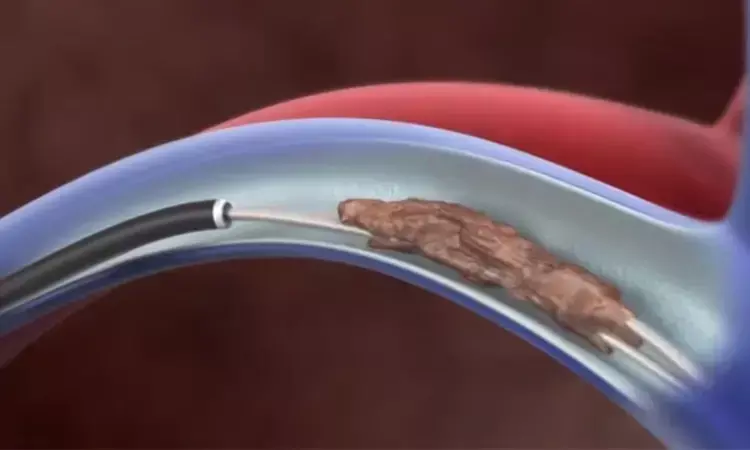- Home
- Medical news & Guidelines
- Anesthesiology
- Cardiology and CTVS
- Critical Care
- Dentistry
- Dermatology
- Diabetes and Endocrinology
- ENT
- Gastroenterology
- Medicine
- Nephrology
- Neurology
- Obstretics-Gynaecology
- Oncology
- Ophthalmology
- Orthopaedics
- Pediatrics-Neonatology
- Psychiatry
- Pulmonology
- Radiology
- Surgery
- Urology
- Laboratory Medicine
- Diet
- Nursing
- Paramedical
- Physiotherapy
- Health news
- Fact Check
- Bone Health Fact Check
- Brain Health Fact Check
- Cancer Related Fact Check
- Child Care Fact Check
- Dental and oral health fact check
- Diabetes and metabolic health fact check
- Diet and Nutrition Fact Check
- Eye and ENT Care Fact Check
- Fitness fact check
- Gut health fact check
- Heart health fact check
- Kidney health fact check
- Medical education fact check
- Men's health fact check
- Respiratory fact check
- Skin and hair care fact check
- Vaccine and Immunization fact check
- Women's health fact check
- AYUSH
- State News
- Andaman and Nicobar Islands
- Andhra Pradesh
- Arunachal Pradesh
- Assam
- Bihar
- Chandigarh
- Chattisgarh
- Dadra and Nagar Haveli
- Daman and Diu
- Delhi
- Goa
- Gujarat
- Haryana
- Himachal Pradesh
- Jammu & Kashmir
- Jharkhand
- Karnataka
- Kerala
- Ladakh
- Lakshadweep
- Madhya Pradesh
- Maharashtra
- Manipur
- Meghalaya
- Mizoram
- Nagaland
- Odisha
- Puducherry
- Punjab
- Rajasthan
- Sikkim
- Tamil Nadu
- Telangana
- Tripura
- Uttar Pradesh
- Uttrakhand
- West Bengal
- Medical Education
- Industry
Alarmingly low rates of lead extraction in patients with implanted cardiac devices and endocarditis against guidelines

USA: Infections associated with cardiac implantable electronic devices (CIED) are tied to substantial mortality, morbidity, and costs. Guidelines have revealed endocarditis as a Class I indication among patients with CIEDs for transvenous lead removal/extraction (TLE).
A recent study, however, has found the utilization of lead extraction to be low among patients with CIEDs and endocarditis, despite low rates of procedural complications. Lead extraction management is linked with remarkably lower mortality, and there has been an upward trend in its use between 2016 and 2019.
In their study featured in the Journal of the American College of Cardiology, the authors suggest that barriers to lead removal for patients with cardiac implants and endocarditis require investigation.
Jim W. Cheung, Weill Cornell Medicine and NewYork-Presbyterian Hospital in New York City, and colleagues reported that transvenous lead extraction occurred in 11.5% of patients with cardiac implantable electronic devices admitted with endocarditis in the Nationwide Readmissions Database (NRD). They noted that the proportion increased remarkably over time but remained low, increasing from 7.6% in 2016 to 14.9% in 2019.
"The alarmingly low rates raise serious concerns about managing such patients in real-world clinical practice and should be a "call to arms" for the field," Ayman A. Hussein, MD, of the Cleveland Clinic, and colleagues wrote in an accompanying editorial.
The research team sought to study the utilization of lead extraction among hospital admissions with infective endocarditis using a nationally representative database.
Using the NRD, the researchers evaluated 25,303 hospitalizations for patients with implanted cardiac devices and endocarditis between 2016 and 2019 based on the Clinical-Modification (ICD-10-CM) codes, International Classification of Diseases-10th Revision.
The authors reported the following findings:
- Among hospitalizations for patients with cardiac implants and endocarditis, 11.5% were managed with lead extraction. The proportion undergoing lead extraction increased significantly from 2016 to 2019 (7.6% vs 14.9%).
- Procedural complications were seen in 2.7%. Index mortality was remarkably lower among patients managed with TLE (6.0% vs 9.5%).
- Staphylococcus aureus infection, large hospital size, and implantable cardioverter-defibrillator were independently associated with TLE management.
- TLE management was less likely with female sex, older age, kidney disease, and dementia.
- After adjustment for comorbidities, lead extraction was independently linked with significantly lower odds of mortality (adjusted OR: 0.47 by multivariable logistic regression and adjusted OR: 0.51 by propensity score matching).
Limitations to the study included a lack of assessment of the cause of death, its observational design, the inherent flaws of extensive registry inquiries and the use of diagnostic codes without a longer duration of follow-up.
Reference:
The study, "Low Utilization of Lead Extraction Among Patients With Infective Endocarditis and Implanted Cardiac Electronic Devices", was published in the Journal of the American College of Cardiology. DOI: https://www.jacc.org/doi/full/10.1016/j.jacc.2023.02.042
Dr Kamal Kant Kohli-MBBS, DTCD- a chest specialist with more than 30 years of practice and a flair for writing clinical articles, Dr Kamal Kant Kohli joined Medical Dialogues as a Chief Editor of Medical News. Besides writing articles, as an editor, he proofreads and verifies all the medical content published on Medical Dialogues including those coming from journals, studies,medical conferences,guidelines etc. Email: drkohli@medicaldialogues.in. Contact no. 011-43720751


